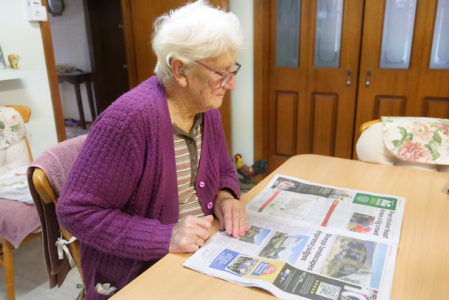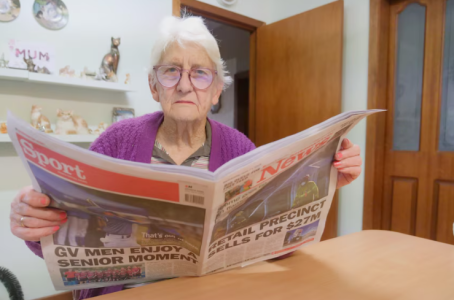Shepparton News ends daily print editions as readers move online
By
ABC News
- Replies 9
Sylvia Campbell has fond memories of her late husband flicking through the local daily newspaper, Shepparton News.
The northern Victorian paper was a fixture in the Campbell house and, once it was read, would be taken to the neighbour, sharing the cost.
"He used to sit and read the paper every day," she said.
"If I was lucky and it did not go next door, I would get to read the paper but half the time it had gone before I got back home.
"But he has been gone now nearly 11 years, so just one less expense for me when you are on your own."
The 84-year-old said she still occasionally picked up the paper and would often hear about its news through a close friend who bought it every day.
But that will come to an end soon.
McPherson Media Group announced last week that Shepparton News and another of its papers, Echuca's Riverine Herald, will become twice-weekly print editions.
The Riverine Herald was printed three times a week.
The company, which has run Shepparton News for 135 years, said the change would start on July 14 with printed editions on Tuesdays and Fridays.
It said it would provide daily news updates on its digital platforms through an upgraded mobile app, newsletters and audio bulletins.
Executive chairman Ross McPherson told the ABC's Statewide Drive program the company was adapting to fundamental changes in the industry.
"Nearly 80 per cent of our readers now are on mobile devices of one kind or another," he said.
"We need to provide the kind of service they are looking for."
Mr McPherson said the company had been considering the move for years.
"Most of our print readers are the older age groups and they are gradually dying," he said.
"Few under 50 pick up a print paper as often as they used to.
"People look for their news in a convenient mobile, tablet or desktop sort of environment these days."
Older readers lament
Ms Campbell, vice-president of the Shepperton Senior Citizens Club of about 90 members, which has existed for more than 65 years, said the decision was "not helping the elderly at all".
"A lot of us do not have computers or laptops so that [the print paper] is where we get our information," she said.
"It makes it very hard for the older ones."
Deakin University Professor of Communication and Australian local news expert, Kristy Hess, said a national study conducted a few years ago found the demand for local print news remained strong.
"People are very passionate about feeling a newspaper between their fingertips," she said.
Professor Hess said it was important that the media industry's continued shift towards digital platforms factored in everyone's needs.
"I have long highlighted that that shift has to be slow to accommodate older audiences to address issues of digital literacy," she said.
Written by Callum Marshall and Warwick Long, ABC News.
The northern Victorian paper was a fixture in the Campbell house and, once it was read, would be taken to the neighbour, sharing the cost.
"He used to sit and read the paper every day," she said.
"If I was lucky and it did not go next door, I would get to read the paper but half the time it had gone before I got back home.
"But he has been gone now nearly 11 years, so just one less expense for me when you are on your own."
The 84-year-old said she still occasionally picked up the paper and would often hear about its news through a close friend who bought it every day.
But that will come to an end soon.
McPherson Media Group announced last week that Shepparton News and another of its papers, Echuca's Riverine Herald, will become twice-weekly print editions.
The Riverine Herald was printed three times a week.
The company, which has run Shepparton News for 135 years, said the change would start on July 14 with printed editions on Tuesdays and Fridays.
It said it would provide daily news updates on its digital platforms through an upgraded mobile app, newsletters and audio bulletins.
Executive chairman Ross McPherson told the ABC's Statewide Drive program the company was adapting to fundamental changes in the industry.
"Nearly 80 per cent of our readers now are on mobile devices of one kind or another," he said.
"We need to provide the kind of service they are looking for."
Mr McPherson said the company had been considering the move for years.
"Most of our print readers are the older age groups and they are gradually dying," he said.
"Few under 50 pick up a print paper as often as they used to.
"People look for their news in a convenient mobile, tablet or desktop sort of environment these days."
Older readers lament
Ms Campbell, vice-president of the Shepperton Senior Citizens Club of about 90 members, which has existed for more than 65 years, said the decision was "not helping the elderly at all".
"A lot of us do not have computers or laptops so that [the print paper] is where we get our information," she said.
"It makes it very hard for the older ones."
Deakin University Professor of Communication and Australian local news expert, Kristy Hess, said a national study conducted a few years ago found the demand for local print news remained strong.
"People are very passionate about feeling a newspaper between their fingertips," she said.
Professor Hess said it was important that the media industry's continued shift towards digital platforms factored in everyone's needs.
"I have long highlighted that that shift has to be slow to accommodate older audiences to address issues of digital literacy," she said.
Written by Callum Marshall and Warwick Long, ABC News.











